People seldom differentiate between
the terms culture and society in daily speech, but the terms have subtly
different meanings, and for a sociologist, the distinction is significant. A
society identifies a group of persons who share a culture and a community.
Sociologists refer to a definable area by "community," as small as a
neighborhood (Lahore, or "the eastern side of the city"), as big as a
nation (Ethiopia, the United States, or Nepal), or somewhere between (in
America, this might include someone who identifies with Southern or Midwestern
society). To illustrate, a culture expresses a group's beliefs and practices,
while society reflects the persons who share those beliefs and practices.
Without the other, neither civilization nor culture will survive.
Meaning and Nature of Culture
It might be important to remember,
before going any further, that commonly people sometimes misuse the idea of
culture. Certain myths regarding the word ‘culture’ are:
The word culture is used by many
people in the western world in the sense that some persons are more
"cultured" than others. This stems primarily from the notion that
applies to "civilization" synonymous with the root word of the words
people, "culture" in German. Thus, he or she is said to be civilized
as one is said to be "cultured." Culture requires even more for
sociologists and anthropologists than refinement, taste, elegance, schooling
and fine arts enjoyment. Not only university graduates, but all persons are
'cultured' as well.
A second misconception widely used is
one which equates "culture" with colorful items, rituals, clothing,
foods, dancing, music, etc. In terms of colorful traditions, songs, dance and
adornments, clothes, jewelry and hairstyles, many people have come to think
about culture. Taken to an extreme, those images represent society rather than
what average people live every day of their life, not just because they have
festivals, as recreational and essentially unselfish.
A third misunderstanding about what
culture is and what it constitutes is the one that many popular people here in
Pakistan can entertain. This misunderstanding is similar to the second, but it
differs from it in that most people here believe that culture is what applies
to specific typical material artifacts or non-material items of the past (as
conceptualized in its local language, for instance, Saraiki in Bahawalpur). According
to this view, objects (material or non-material) that are new, more common,
day-to-day, facets of life may not be included in culture.
One of the most commonly used notions
in sociology is the theory of community. This extends to the entire lifestyles
of the citizens of a group. It concerns what they wear, their practices of
marriage and family life, painting, work habits, religious rituals,
recreational pursuits, and so on. The material products they manufacture are
also included. The definition of culture has been defined by sociologists and
anthropologists hundreds of times, stressing various aspects.
Basic Characteristics of Culture
Culture is Overt and Covert:
It is commonly split into communities
that are cultural and non-material. Material culture consists of all physical
items created by humans, such as instruments, boats, buildings, etc.
Non-material culture consists of all things that are not tangible, such as
vocabulary, ideology, thoughts, awareness, mentality, beliefs, etc.
Culture is Stable and Yet Changing:
In order to uphold their norms and
beliefs, culture is stable as we understand what people find precious and are
turning over to the next generation. When civilization falls into contact with
other cultures, however, it will change. However, not only due to overt or
indirect interaction between societies, but also through creativity and
adapting to different situations, culture evolves.
Culture is Organic and Supra-Organic:
When we accept the fact that there is
no civilization without human society, it is organic. Since it is well past the
human lifespan, it is supra-organic. Individuals come and go, but culture
continues and survives.
Culture is Ideal and Manifest (Actual):
The perfect culture requires the way
people should act or what they should do. Manifest culture encompasses what
individuals really do.
Culture is shared and learned:
Culture is the public property of a
group of individuals in society (shared). By socialization, individuals get
cultural awareness of the group. We should remember, however, that all items
shared among individuals may not be cultural, as there are several biological
characteristics that people share with each other.
Culture is Explicit and Implicit:
When we accept those acts that can be
readily clarified and defined by those that conduct them, it is explicit. When
we consider those things we do, it is implicit, yet we are unable to describe
them, but we assume that they are so.
Culture is Symbolic:
It is based on the purposeful development
of icons and their use; it is unique to humans. Symbolic thinking is unique to
humanity and to culture and is crucial. Symbolic thinking is the human capacity
to assign an arbitrary meaning to a thing or event and to grasp and recognize
that symbols are the core components of culture. Symbols refer to something to
which persons assign importance and which they use to engage with others. More
precisely, symbols are words, objects, movements, sounds or pictures that are
not themselves, but represent something else. In the abstract domain, culture
thus operates by stressing symbolism, rather than the technical/practical
logical side of human behavior. Both activities have both expressive content
and action in and of themselves. Objects, acts, attitudes, etc, often reflect
something more than just the object itself.
Read More:
Elementsof Culture and Cultural Variations
Key words: Sociology, Introduction to sociology, Book of sociology, Culture, Institutions, Organizations, Types of Sociology, What is Sociology, Society, Human Behaviors, PDF Book Sociology, Scope of Sociology, Types of Sociology, Self,

